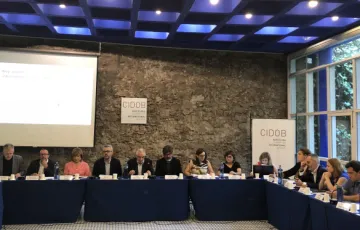Representatives of the main city networks strive to create new alliances to enhance the role of cities internationally

CIDOB organises a meeting with key actors from the global ecosystem of city networks and academic experts that it aims to turn into an annual event
Cities have established themselves as major players on the international scene. By joining forces in organized networks, they have been able to influence global agendas, defend their interests, promote their needs and find solutions to shared problems. With the aim of analysing the changing dynamics of this ecosystem of city networks in recent years, CIDOB organized the conference Rethinking the ecosystem of international city networks: challenges and opportunities on 3rd July. The conference, which brought together key actors from the ecosystem, focused on examining how the main networks operate, what influence they have on global agendas, what services they offer their partners and how they coordinate their efforts.
Emerging versus traditional city networks
The conference organized by CIDOB takes place at a complex moment. The increasing centrality of the urban question has led to the emergence of new city platforms like 100 Resilient Cities or C40 that are largely financed by philanthropists such as the Bloomberg and Rockefeller foundations. These new platforms are structures with high budgets, very professional teams and very powerful communication strategies "that attract the planet´s most important mayors and that function as an exclusive club" said Agustí Fernández de Losada, Director of CIDOB´s Global Cities Program and coordinator of the seminar. In recent years, they have begun to occupy part of an ecosystem previously reserved for "traditional" networks, such as UCLG, Metropolis or Eurocities, which have for years been driven and financed by cities themselves.
The experts that gathered in Barcelona highlighted both the risks and opportunities that emerge from this reconfiguration of the international ecosystem of city networks:
- The risks are related to the diffusion of efforts and the lack of complementarity and coordination, all of which potentially translate into communication problems with the international organizations behind the major global agendas.
- Opportunities were identified in the formulation of new approaches to advocating the international presence of cities in spaces that foster alliances with other actors who are central to promoting better urban policies.
Weaving alliances to strengthen the role of cities
During the conference, the need to promote new partnerships among the different city networks, as well as with universities and research centres, civil society and private sector organizations was emphasised. At the same time, it was stressed that alliances should also be forged with international organizations and national governments, which continue to hold the power to change the system of international governance and which can support cities in their efforts to get a seat at the global table.
Further, the importance of democratizing the networks’ governance structures by making them more transparent and accountable was underscored, as well as the necessity to engage in a dialogue with citizens and local stakeholders to learn about their needs, interests and aspirations.
The conference was very well received by the participants and the possibility of making it an annual event that creates a space for dialogue between the different actors involved in the ecosystem is currently evaluated. The results and conclusions of the conference will be published by CIDOB as part of its Monographies series by the end of this year.
The seminar was organised by CIDOB´s Global Cities Program, which is supported by Barcelona City Council and which seeks to generate research that proposes innovative solutions to the challenges shared by cities around the world.